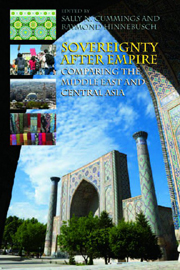Book contents
- Frontmatter
- Contents
- Acknowledgments
- Notes on the Contributors
- 1 Introduction
- SECTION I Histories of Empire and After
- 2 Russian Empires
- 3 The British and French Empires in the Arab World: Some Problems of Colonial State-formation and its Legacy
- 4 Ottoman Legacies and Economic Sovereignty in Post-imperial Anatolia, Syria and Iraq
- SECTION II Paths to Sovereignty: Views from the Core and Periphery
- SECTION III Empire and Domestic Sovereignty
- SECTION IV Empire and Popular Sovereignty
- SECTION V Empire and External Sovereignty
- Bibliography
- Index
4 - Ottoman Legacies and Economic Sovereignty in Post-imperial Anatolia, Syria and Iraq
from SECTION I - Histories of Empire and After
Published online by Cambridge University Press: 12 September 2012
- Frontmatter
- Contents
- Acknowledgments
- Notes on the Contributors
- 1 Introduction
- SECTION I Histories of Empire and After
- 2 Russian Empires
- 3 The British and French Empires in the Arab World: Some Problems of Colonial State-formation and its Legacy
- 4 Ottoman Legacies and Economic Sovereignty in Post-imperial Anatolia, Syria and Iraq
- SECTION II Paths to Sovereignty: Views from the Core and Periphery
- SECTION III Empire and Domestic Sovereignty
- SECTION IV Empire and Popular Sovereignty
- SECTION V Empire and External Sovereignty
- Bibliography
- Index
Summary
Empires exhibit a variety of economic configurations, and legacies of the imperial era play a pivotal role in shaping the economies of post-imperial states. Yet the economic implications of the end of empire remain largely unexplored, in sharp contrast to the scholarly attention that has been lavished on the political, social and cultural transformations that accompany the dissolution of imperial structures of governance.
In particular, imperial economies differ from one another in at least three ways: (1) the degree of interdependence that exists among different provinces of the empire; (2) whether taxation in the provinces is carried out through direct or indirect mechanisms; and (3) whether trade and manufacturing are regulated in a unitary or multidivisional fashion. Such structural features of the imperial order determine the extent to which post-imperial states are born with the incentive and capacity “to regulate the flow of goods, persons, pollutants, diseases, and ideas across [their respective] territorial boundaries,” that is, to exercise fundamental aspects of economic sovereignty.
Economic Legacies of Empire
High levels of interdependence among provinces of the empire increase the vulnerability of post-imperial states, and give their leaders a strong incentive to turn to government agencies to ensure the stability of the local economy. Countries that inherit established industrial plants but lose secure access to raw materials and other vital inputs, for example, can be expected to embark on state-led campaigns to develop mineral and fuel production at home rather than rely on imports from other former provinces.
- Type
- Chapter
- Information
- Sovereignty after EmpireComparing the Middle East and Central Asia, pp. 66 - 88Publisher: Edinburgh University PressPrint publication year: 2011

